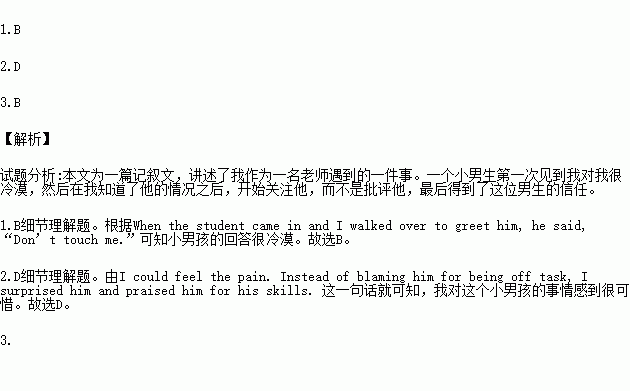题目内容
I became a teacher at 55 years of age. Things were going on so well during my first two periods. Then came my 3rd period class – the 8th graders with only one girl in the class. I thought the class was bad until the intercom(内部通话系统) came on and the office was asking if I was in my classroom. “Of course,” I responded. A student who knew he was going to be late for class had informed the office I was not in my classroom – 10 minutes after class began.
When the student came in and I walked over to greet him, he said, “Don’t touch me.” He then put his head on his desk and did not seem to listen to a word I said. I did not comfront(使面对) him with the “lie” to the office.
The next day he came into class on time. This time instead of listening or following instructions on keyboarding software, he played Internet games. I walked over to him. He looked at me ready to snap back(没好气地顶撞) at anything I said. I asked him, “Where did you learn to use a computer like that?” he looked at me surprised. I repeated, “You are really good at that. Where did you learn so much?” He began to tell me his father “used to” buy him games to play, but not anymore. I could feel the pain. Instead of blaming him for being off task, I surprised him and praised him for his skills. Then, I asked him to show me what he could do in our software. He was amazed.
On a Friday night at a high school football game, I really got my breakthrough(突破). From about five feet away, in front of his friends he came over to me and gave me a big hug saying, “Hi, Ms. Marie.” We talked for a while and before he walked away, he had hugged me two more times. This was a long way from “don’t touch me” on that first day.
1.How did the boy react(反应) towards Ms. Marie’s greeting on the first day?
A. Gratefully. B. Coldly.
C. Respectfully. D. Amazedly.
2.From the dialogue between Ms. Marie and the boy in Paragraph 3, we can infer that _____.
A. the boy was impatient with Ms. Marie’s interruption
B. the boy was proud to show how to play games
C. Ms. Marie was curious about the boy’s father
D. Ms. Marie felt sorry for the boy
3.By saying “I really got my breakthrough”, Ms. Marie meant _____.
A. she finally learned to play games
B. she won the boy’s trust in the end
C. she scored at the football game
D. she made great achievements in teaching

